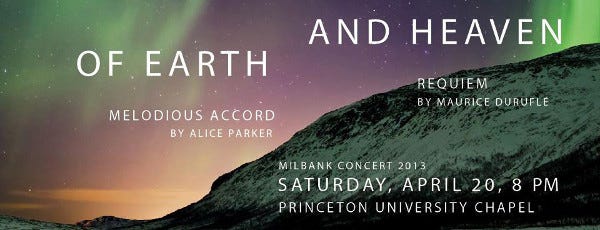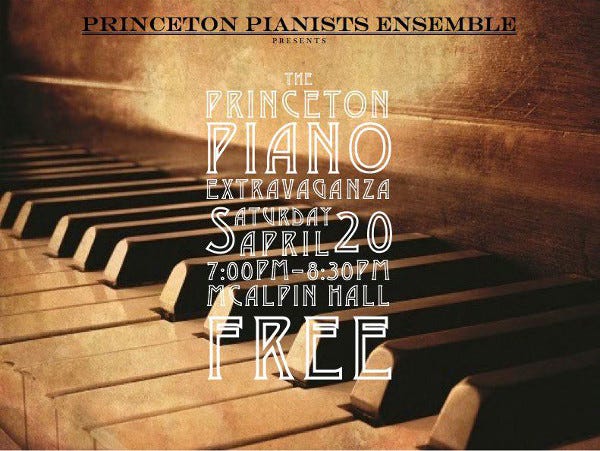Concert Hopping
The Princeton Piano Extravaganza
Princeton Pianists’ Ensemble
Saturday, May 20
Earth and Heaven
A Performance of Melodious Accord by Alice Parker and Requiem by Maurice Duruflé
Princeton University Chapel Choir
Penna Rose, Conductor
Eric Plutz, Organist


Last Friday night I had a minor conundrum. Two intriguing concerts had overlapping times. The much-advertised Piano Extravaganza (5 pianos, 40 hands) was from 7:00 pm to 9:00, and the Chapel Choir concert started at 8:00. Both were free. So I decided to concert-hop, an activity that the arts and social scene at Princeton is quite conducive to and that I will likely miss when I graduate.
First stop: the Princeton Pianists’ Ensemble shebang in McAlpin Hall, Woolworth building. The first impression I got of PPE was that of a frazzled, excited, confused and humble group of performers. “We were not expecting this many people to show up!” said the girl standing by the door and trying ineffectively to get the droves of audience members to take seats on the floor above, where they would have to watch the concert through a glass window. McAlpin was over capacity, a fire hazard: an auspicious beginning for a new music group on campus. The first piece was Ravel’s Boléro. When the first piano started the melody I felt uneasy. Boléro is a long, somewhat droning piece consisting of repetition and variation of a simple melodic theme. A full orchestra played the version I knew, in which different instruments and instrument combinations were featured in each repetition. So I didn’t think it worked quite well with just pianos. It lumbered a bit and the expectation of an “extravaganza!” was met with a rather meditative and low-key performance of at most two people per piano. This quality is not inherently bad, however. A professor noted during intermission, “That was quite nice! It was lovely to see how the character of the theme changes so slightly with the different tonal combinations.”
My thirst for wildness was quenched during Lavignac’s Galop-Marche, in which there were four players per piano on three pianos. Numerous individual parts interlaced, the pianists swayed as a group for the higher and lower parts, sometimes one player stopped playing, leaning back to allow more room for the others. Everyone was smiling at the absurdity, and the room was electric for the span of the piece.
After Flight of the Bumblebee, one of their advertised pieces, I skipped out to canter over to the chapel. I missed the beginning, and I didn’t have a program, so I had to be content to just slink in and see if I could figure out what was going on.
How different the tone of the event was! The harp, organ and voices swelled and settled, emotional, like alternating wind and calm of early summer. Because I didn’t have a program and thus had no way of distracting myself with composer names or lyrics, the performance was also quite intellectually stimulating. I was approaching this grand venue and peaceful music with the images and sounds of eight shoulders bouncing over one piano, so it’s not surprising that I was in an analytical, comparative mood. Just what made the first piece of Earth and the second of Heaven, I wondered (only having the music to base my judgments on)? Occasionally words would leave the choir’s collective mouth whole and make it all the way back to me. I then had these fragments: “joy,” “pain,” “come,” “Lord” to mull over while the harp, organ and round, echoing voices wrapped around me.
I have a bit of a history with the Chapel choir as a viewer. As a freshman I used to attend Sunday morning ecumenical services often just to hear them, and they helped soothe the various aches of that first year of college. In the audience on Friday, as I settled down into the reflective mood they always manage to induce in the vast and dim chapel, I realized that I hadn’t heard them at all so far sophomore year. It was a happy reunion. With the conversation on campus about mental health issues and stress rising to a new volume in the past few months due to the What I Be campaign and the dismal results of the COMBO survey, I wondered why the chapel didn’t have more students. It is not a novel revelation that soothing live music once in a while or quiet reflection in a situation such as a spiritual music concert (regardless of what religion it is from or what your own stance on religion is) is beneficial to mental health. On that matter, let my voice be at least one that advocates for getting out and attending free concerts when you can to deal with stress!
On a different matter, though, that is on the matter of music at Princeton, let me say that on Friday of last week the campus was both graced with another solid performance by the well-established Chapel Choir and introduced to the previously unheard sounds and sights of multiple pianos at once by the nascent Pianists’ Ensemble. This weekend brings with it a host of new performances to explore with friends or alone, and I encourage an open attitude to the array of choices. And if you are feeling comparative and analytical, check out two in rapid succession. That’s an experience unique to campus life like this.